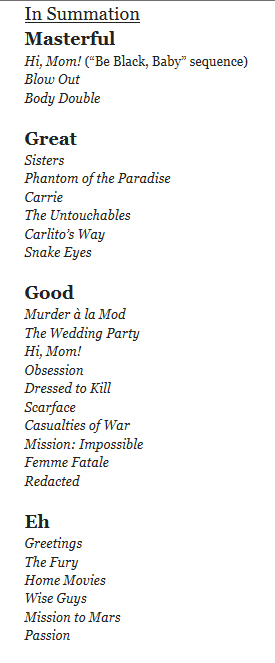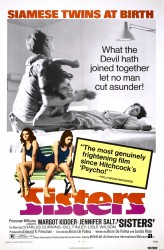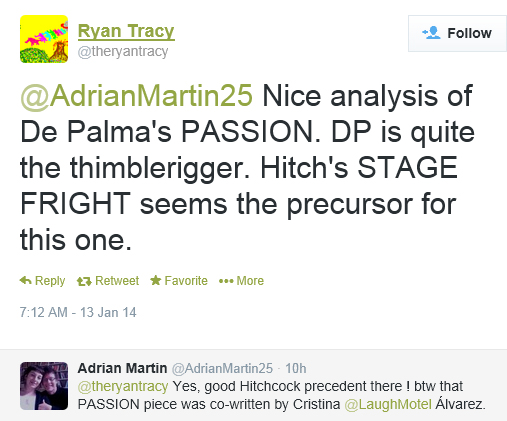"A MORE ACCURATE PORTRAIT OF WOMEN IN THE NEW ECONOMY THAN MOST FILMMAKERS WOULD DARE TO CREATE"

Writing for CounterPunch, Kim Nicolini calls Brian De Palma's Passion a "psycho-economic post-feminist thriller" that is "ferociously entertaining." Nicolini writes about the film with a stunning and fierce clarity, stating right away that "Passion is yet another De Palma exploration of the psycho-economics of sex as it plays out in the artifice of cinema." (Also check out her great piece on De Palma's Scarface in the recently published paper #4 of La Furia Umana-- I'll post about that soon, as well). Here are some excerpts from her CounterPunch piece:
Marketing is a lie. That’s what it does and how it makes money, by selling lies. These women are the products of the very system they work for. They are self-created lies, femme fatales who are constantly shifting until we don’t know who’s who or what’s what.
However, these aren’t just any women. These are women who have subverted their “organic” female identity to survive and thrive in the man’s world of big business. The movie opens with Christine and Isabelle sharing a drink. When they both choke on what they’re drinking, Christine laughs and says, “It’s organic!” Of course it makes them gag. Both women are synthetic products, and organic is like poison to their plastic souls. This movie is largely about the bastardization of the “organic maternal” within the economic professional sphere, about how women subvert the “maternal feminine” to attain power in the global economy. Of course they’re going to choke when they swallow something organic...
With their clothes, shoes and hyper-performed yet subverted sexuality, these women are like high-end office furniture, lamps or mirrors who reflect the environment they occupy. Their interior selves merge with the exterior of the film – the cars, fancy apartments, slick offices. Their motives are driven by interior desire, yet they are also symptoms of the exterior world. They are mere pieces within their economic environment, yet they are also symptoms of it. Their interior and exterior have become the same thing, a reflection of the economic world, a terribly ugly beautiful surface. Their professional economic environment causes the women to act how they act and molds them into what they become.
Passion is a kind of science fiction of the now narrative, a thriller about the mutation of the female cosmology when it’s placed within the global economic sphere and becomes entwined with the market and the forces of power that drive it. Sure these women are vengeful, calculating and in many ways as synthetic as their environment. They are hyper-female yet coldly economic, but they are also seething with sexuality because in De Palma’s movies (like Scarface) sex and economic power are the same thing. These women use sex to maintain their position of dominance and control. Is it attractive? On the exterior they are sexy as hell, even when they are slashing each other’s throats. On the interior, well, these gals have forfeited their interiors so that question doesn’t really matter.
Do they have choices to not be their jobs? Well, it’s not a choice that De Palma gives us. The women’s actions are motivated by artifice, and they in turn become artificial beings, with their designer clothes, executive offices, and marketing campaigns. They are like Stepford women who have graduated from the kitchen and moved into the high rise office building...
We may not be sure who is out to get who, but one thing is for sure – all these women are out to get each other one way or another as they angle for power and position. I refer to this movie as post-feminist cinema because certainly this is not an image of women that feminists would feel comfortable with, but it’s also a more accurate portrait of women in the new economy than most filmmakers would dare to create. There are multiple references to Medusa within the film – the mythic female who turns men to stone when they look at her –, but these women are already stone. It’s like a reverse parable – they have been turned to stone by gazing into and occupying the male world.
Don’t get me wrong. These women may occupy and vie for power within the male marketplace, but they do not act like men. They act like women. They look like women. But they are women from whom the maternal has been excised by economic forces. In one scene, Christine learns that one of her lovers has a daughter, and she is appalled, horrified, and disgusted . . . almost as if she’s choking on an organic drink. She just wants to get fucked. She doesn’t want to breed. The mere idea of the maternal feels like swallowing poison to her.
Updated: Thursday, January 23, 2014 1:42 AM CST
Post Comment | View Comments (1) | Permalink | Share This Post






 Two random rankings of the films of Brian De Palma have popped up on the web within the past few days. While there is some consensus between the two as to the greatness of films such as Carlito's Way, Body Double, and Hi, Mom! (give or take a few degrees), the lists are probably more interesting for their differences. Alex Winthrow, who rated every De Palma film for a directors series at his blog,
Two random rankings of the films of Brian De Palma have popped up on the web within the past few days. While there is some consensus between the two as to the greatness of films such as Carlito's Way, Body Double, and Hi, Mom! (give or take a few degrees), the lists are probably more interesting for their differences. Alex Winthrow, who rated every De Palma film for a directors series at his blog,  In 2011, we
In 2011, we  Kevin Costner, Kenneth Branagh, and Chris Pine conducted a press conference recently for Branagh's new film, Jack Ryan: Shadow Recruit, wherin Costner talked a lot about Sean Connery's role as mentor in Brian De Palma's The Untouchables, and how that informed Costner's own mentorship role to Pine's Jack Ryan in the new film.
Kevin Costner, Kenneth Branagh, and Chris Pine conducted a press conference recently for Branagh's new film, Jack Ryan: Shadow Recruit, wherin Costner talked a lot about Sean Connery's role as mentor in Brian De Palma's The Untouchables, and how that informed Costner's own mentorship role to Pine's Jack Ryan in the new film.  The not so bad news is that
The not so bad news is that  Brian De Palma's Sisters screened in Chicago last night as part of
Brian De Palma's Sisters screened in Chicago last night as part of 